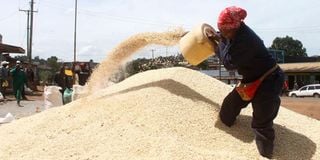Premium
Maize millers demand Sh2.6b subsidy arrears

Farmers dry maize in Elburgon town, Nakuru County, on January 22, 2022.
Cereal millers now want the government to pay the Sh2.6 billion debt incurred during former President Uhuru Kenyatta’s administration before embarking on a plan to import duty-free maize. The money was payment for the subsidised maize which the millers provided last year.
In a series of letters and reports to the government through the Ministry of Agriculture, the Cereal Millers Association (CMA) argues that the delay in paying the debt will affect importation of the next subsidised maize.
“The National Cereals and Produce Board (NCPB) sold 5,264,073 24 bales at a total cost of Sh6,632,731,980. Out of this, CMA member millers sold flour worth Sh4,340,064,312. Only Sh1,769,822,739 was paid, leaving an outstanding balance of Sh2,570,241,572.00 to CMA member mills,” read the report seen by the Sunday Nation.
The government on Friday endorsed importation of an additional 500,000 metric tonnes of white duty free maize and extra 500,000 tons of rice, set to arrive in the country from August 6.
A separate report by the CMA to Parliament said the government signed contracts with Kenyan millers to address maize shortage and import subsidised maize with 129 millers, but they were not paid as agreed.
“The estimated cost of subsidy was approximately Sh8 billion. A special account was opened by the government and credited with Sh4 billion for the subsidy to be paid to millers and the rest to be topped up based on the quantities disbursed into the market that were verified,” reads part of report.
This week, a ship carrying more than 42,000 tonnes of yellow maize docked at the port of Mombasa. No orders have been placed for white maize which is a staple food in the country.
This is the first consignment of subsidised maize to arrive in the country since the authorisation of duty-free imports in December last year to fill shortage of commodity in the country.
MV Stellar Lady carrying 42,464 tonnes of maize from the Port of Odesa in Ukraine docked at the port of Mombasa according to a list of vessels scheduled to dock. No other ship is expected in the country before April.
But millers say the over 40,000 tonnes would not make any difference as yellow maize is mostly used to make animal feeds and oil products.
Millers have warned that the imports will effect only a minimal reduction in the cost of the staple that has hit above Sh210 per a two-kilogram packet.
“Although the imports will ease pressure on competition for white maize for human consumption and manufacture of animal feeds, it is too early to determine when the next consignment will land in the country to sustain continued supply considering the biting shortage of maize in local and regional market,” said David Maina, a miller in Eldoret Town.
Acute shortage of the commodity in the market has led to many millers suspending operations, a month after the government authorised importation of duty free maize into the country.
CMA still maintains that due to the current global crisis, it is not possible to import maize at the Sh4,200 government recommended price.
“At the moment, the cost of a 90-kilo bag of maize grain will vary depending on the source, but would be in the range of Sh5,500 to Sh5,600. It would be difficult to import at Sh4,200 as government wants,” said CMA chief executive officer Paloma Fernandez.
Ms Fernandez said as it is, the earliest Kenyans can expect imported maize is 30 days from the day the order is placed.
Also Read: It’s back to expensive maize flour
“Normally, procurement of grain can take between 30 and 60 days and is subject to availability. We can only estimate the time once any of our millers receives their permits,” said the CEO.
Separately, researchers have suggested President William Ruto might be forced to do more to address the impending maize deficit.
“The government must get the right data for planning purposes because when it comes to importation, you need the right data to guide on the quantities required,” says Dr Timothy Njagi, a principal researcher at Tegemeo Institute.
“Economically, it doesn’t make sense to give farmers fertiliser, because a farmer must also get the good seeds and know how to apply the fertiliser and on the other hand, there is depressed rainfall,” he said.






